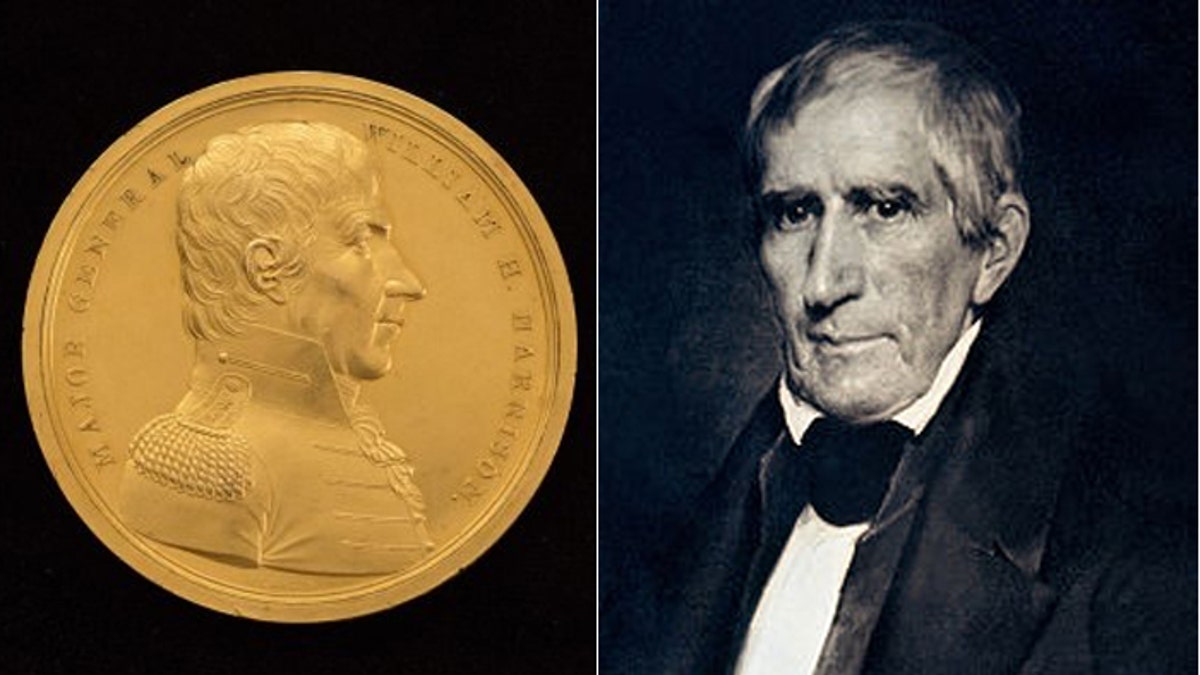
The medal honoring Harrison, pictured in this daguerreotype, is up for sale for $225,000. (Raab Collection)
A medal bestowed upon a young general for his heroics in the War of 1812 is on the market, and experts say it could fetch more than $200,000 – especially considering that its original recipient went on to become president of the United States.
The medal was awarded in 1818 to William Henry Harrison, an Ohio farmer and military hero who would become the ninth president in an administration cut woefully short when he died after just a month in office. Harrison was one of two generals awarded the Congressional Gold Medal for leading the U.S. Army in the war who went on to occupy the White House.
"Sir, I wish you to understand the true principles of the government. I wish them carried out. I ask nothing more."
“It represents a great moment in American history that led to the ascension of an American president. It is a truly unique artifact,” said Nathan Raab, president of the Philadelphia-based Raab Collection.
Raab said the medal has been in the family of Harrison, whose grandson Benjamin also served as president, for nearly two centuries. Family members have declined comment, but have put the 12-ounce medal up for sale with an asking price of $225,000.
The U.S. was barely four decades old and had survived its second major war, thanks in part to the duo of heroic generals – Harrison and Andrew Jackson -- who led a rag-tag army to victory over Great Britain for the second time in America’s nascent history.
Prior to the war, Harrison had led the U.S. Army to the victory of Tippecanoe, defeating Shawnee Indian forces led by legendary warrior Tecumseh in what is now Indiana. Two years later, he again locked horns with Tecumseh, who was allied with the British and would die in the Battle of the Thames. Harrison helped recapture Detroit from British forces in the war.
The Battle of the Thames was considered one of the great American victories in the war, second only to the Jackson-led Battle of New Orleans. But Secretary of War John Armstrong clashed with Harrison and reassigned him to an obscure post, prompting the general to resign. After the war ended, Congress investigated Harrison's resignation and determined he had been unfairly treated.
"That the thanks of Congress be, and they are hereby presented to Maj. Gen. William Henry Harrison.... and to the officers and men... for their gallantry and good conduct in defeating the combined British and Indian forces,” read the April 4, 1818, declaration by Congress which accompanied the awarding of the medal by President James Monroe.
Harrison’s profile is on the front of the medal. Other generals would later be awarded the medal, as well as the presidency. Zachary Taylor received three medals for his service in the Mexican War and Ulysses.S. Grant received one during the Civil War. Of the 30 or so Congressional Gold Medals from the War of 1812 and earlier, only 10 are known to have survived, including Harrison’s, Jackson’s and ones given to Navy commodores Stephen Decatur and Thomas Truxton.
The Congressional Gold Medal and the Presidential Medal of Freedom are America's highest civilian awards. Unlike the Congressional Medal of Honor and other military awards which cannot be sold under federal law, they can be sold, traded or given away. The Congressional Gold Medal is reserved for those "who have performed an achievement that has an impact on American history and culture that is likely to be recognized as a major achievement in the recipient's field long after the achievement." In the 19th Century, the award generally was reserved for military leaders. But winners in the 20th Century included such cultural figures as Pope John Paul II, Rosa Parks, Nelson Mandela, John Wayne, Frank Sinatra, Charles Lindbergh and Walt Disney.
Harrison died on April 4, 1841, at age 68 after just 30 days in office of what was believed to be pneumonia, brought on by his insistence on going coatless at his inauguration. That theory has since been debunked, and his death is now believed to have been brought on by enteric fever, possibly caused by the White House's then-proximity to raw sewage.
"Sir, I wish you to understand the true principles of the government," were his last words to a doctor, with the presumption they would be relayed to Vice President John Tyler. "I wish them carried out. I ask nothing more."

